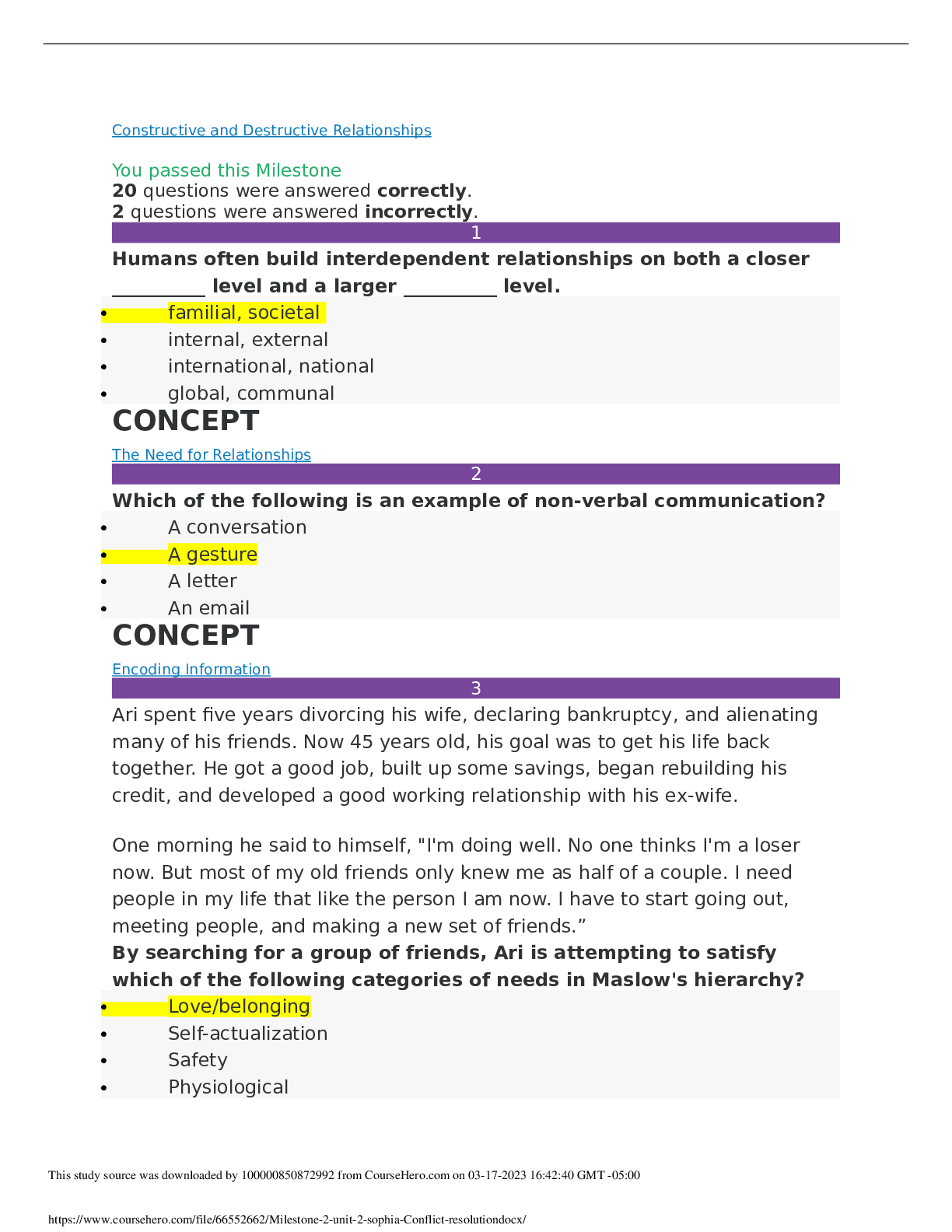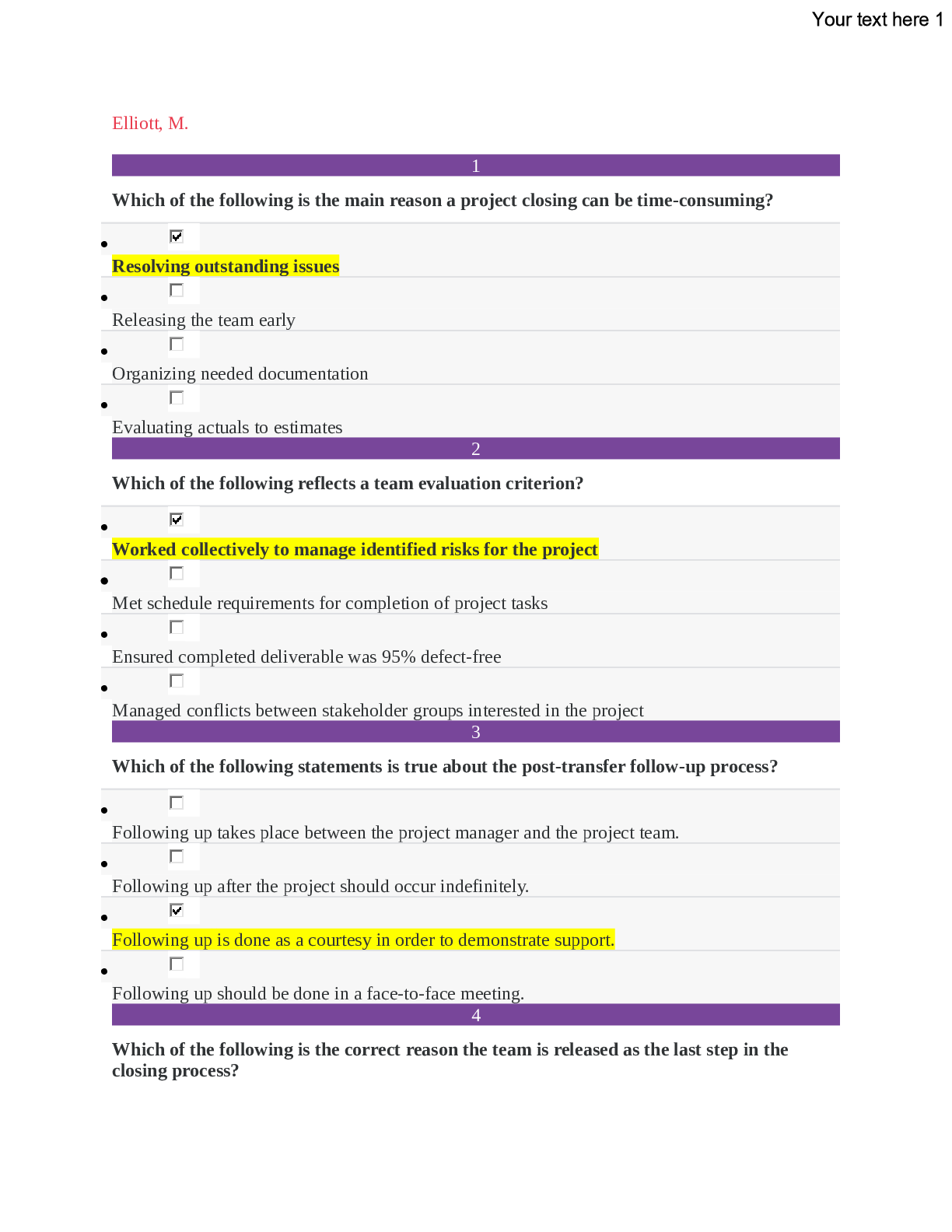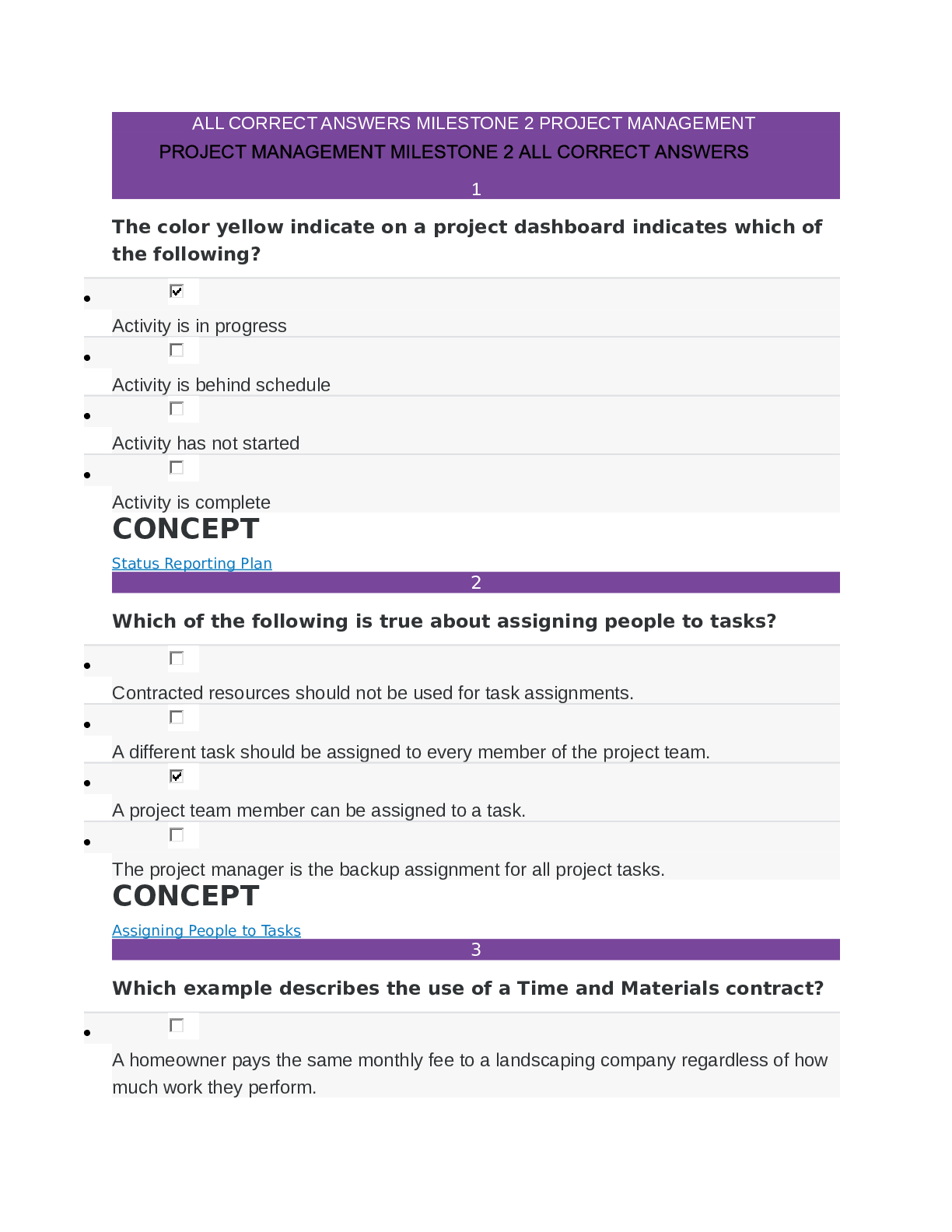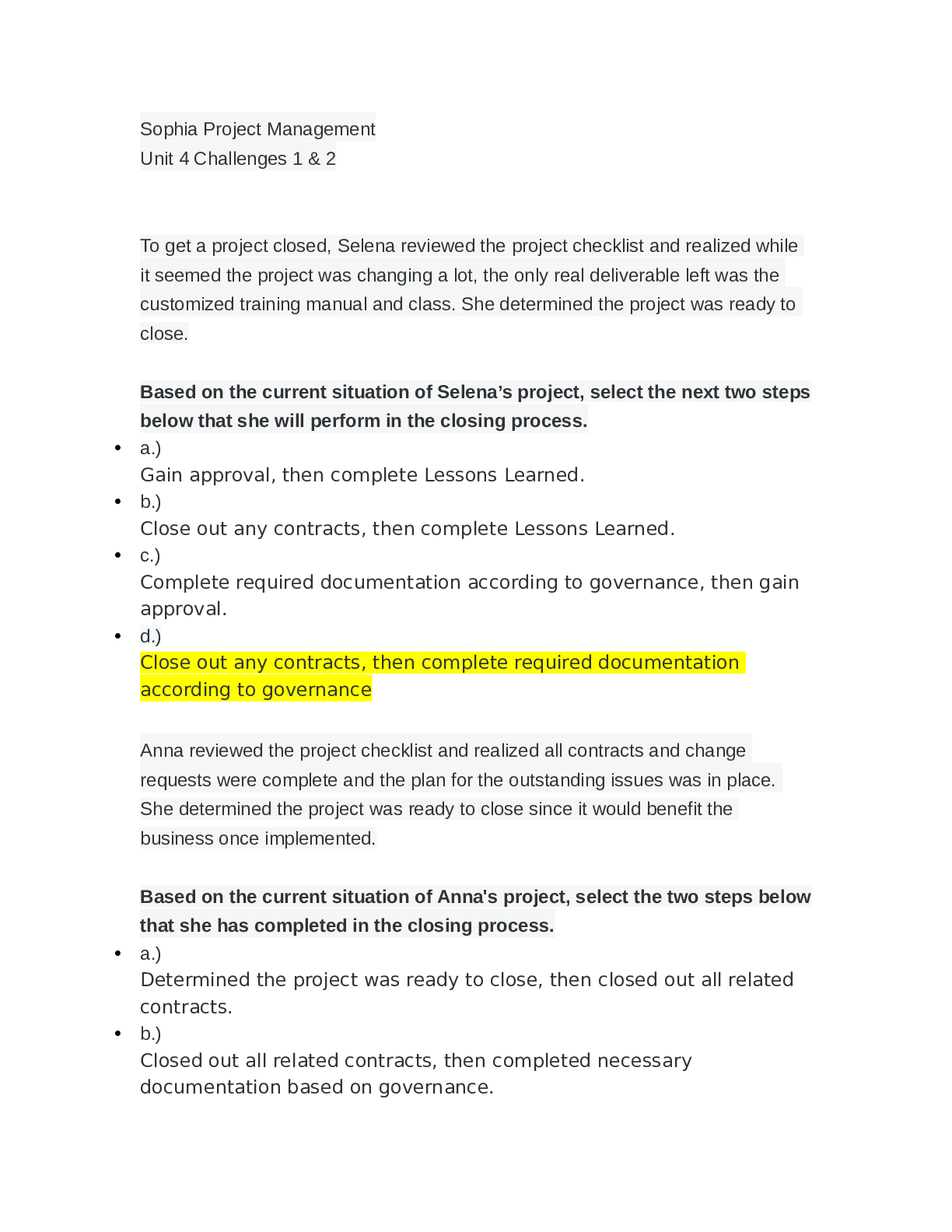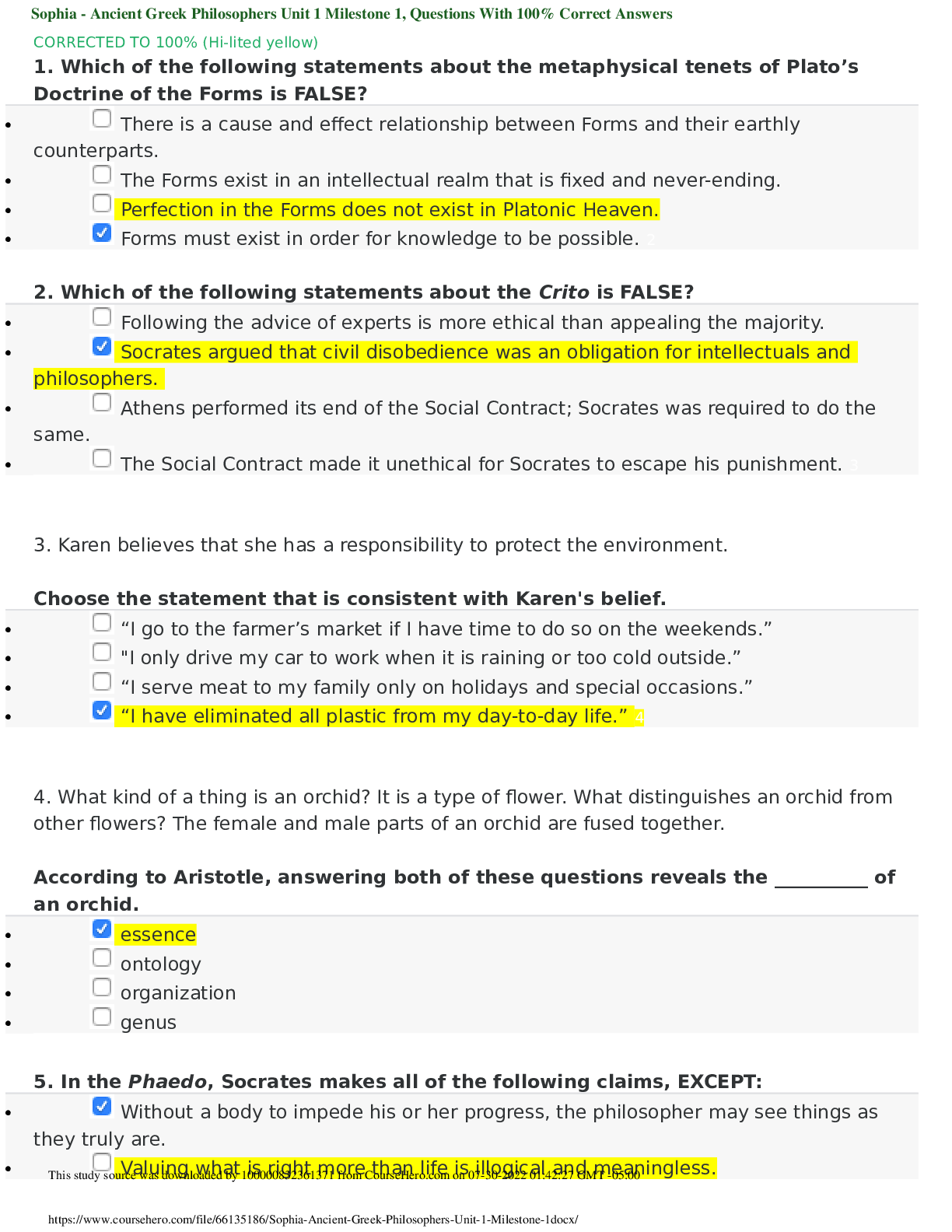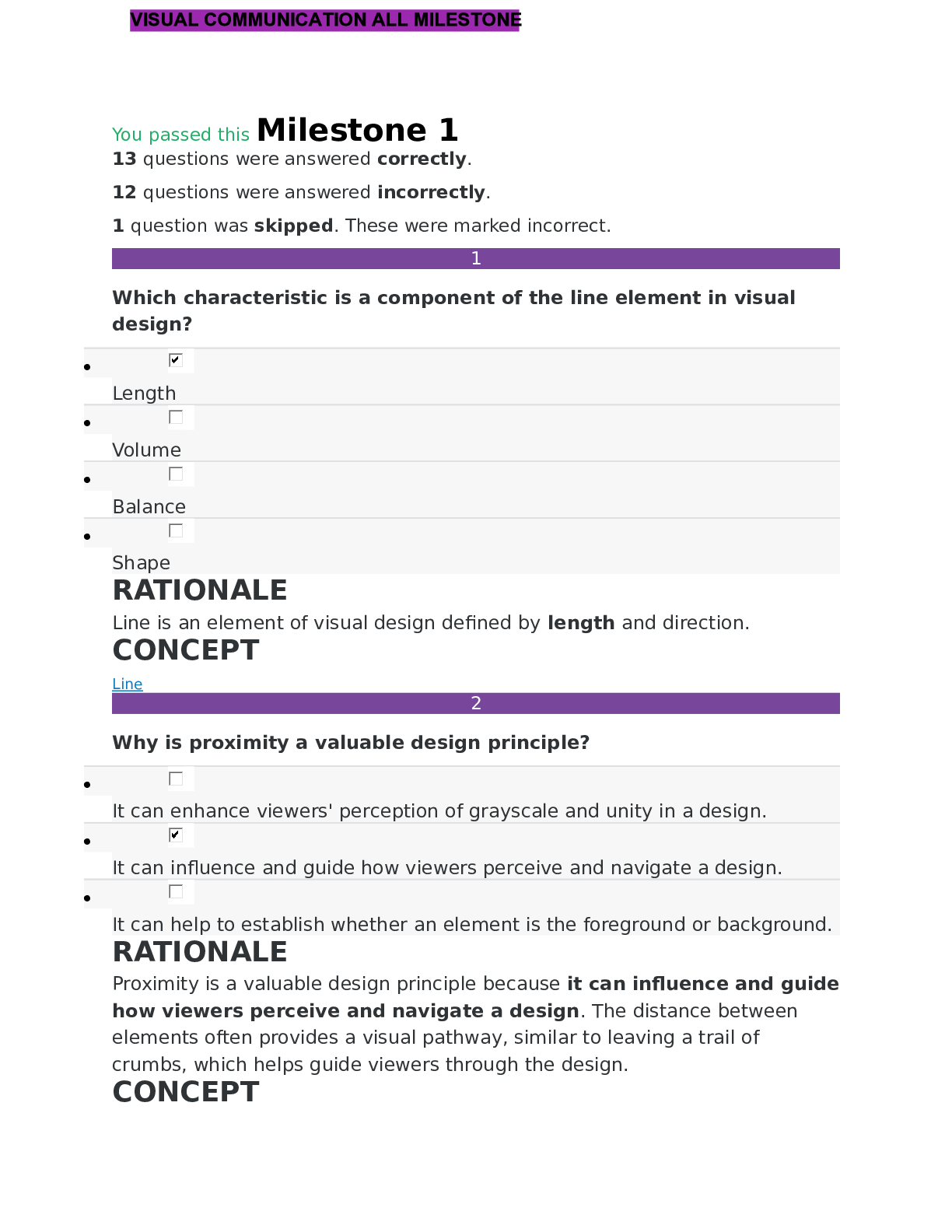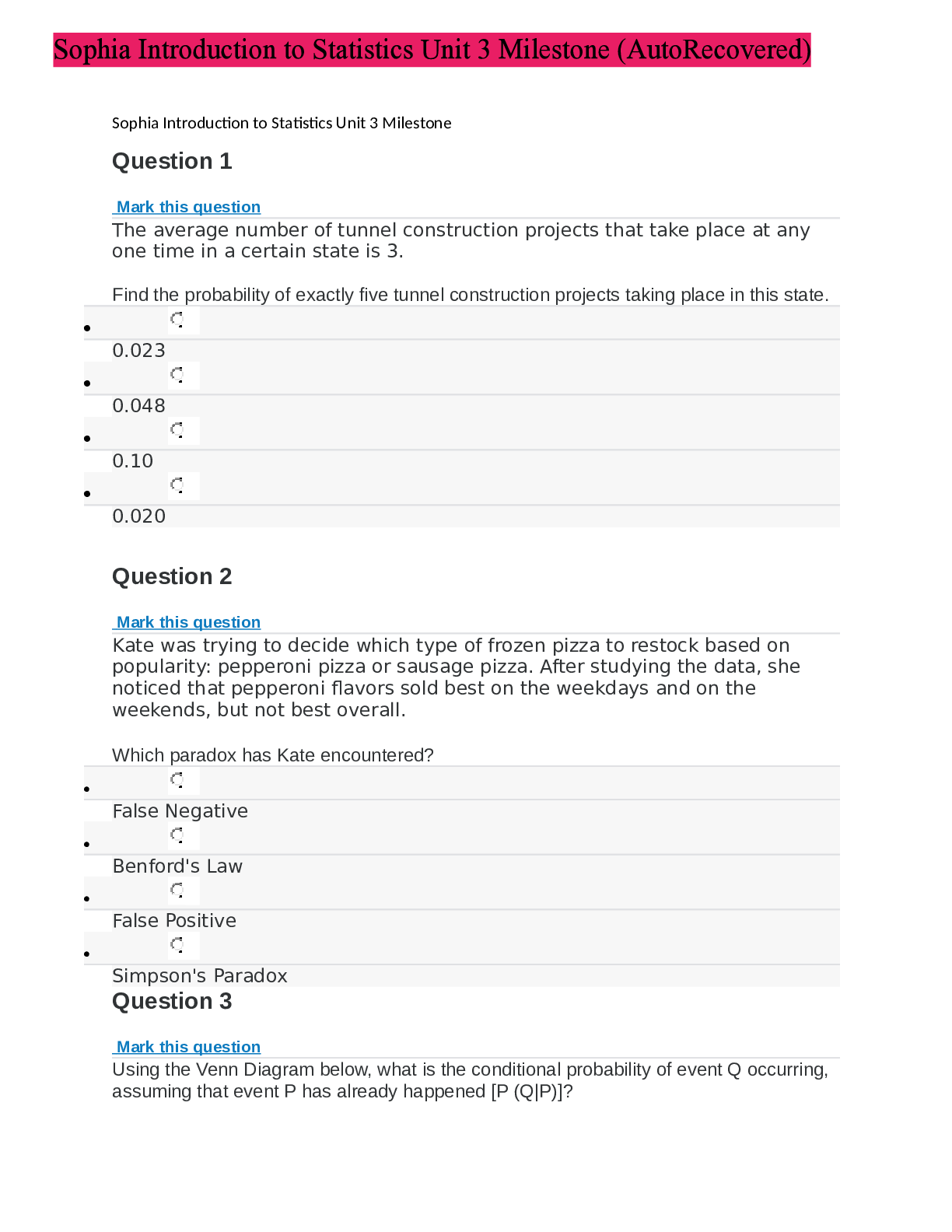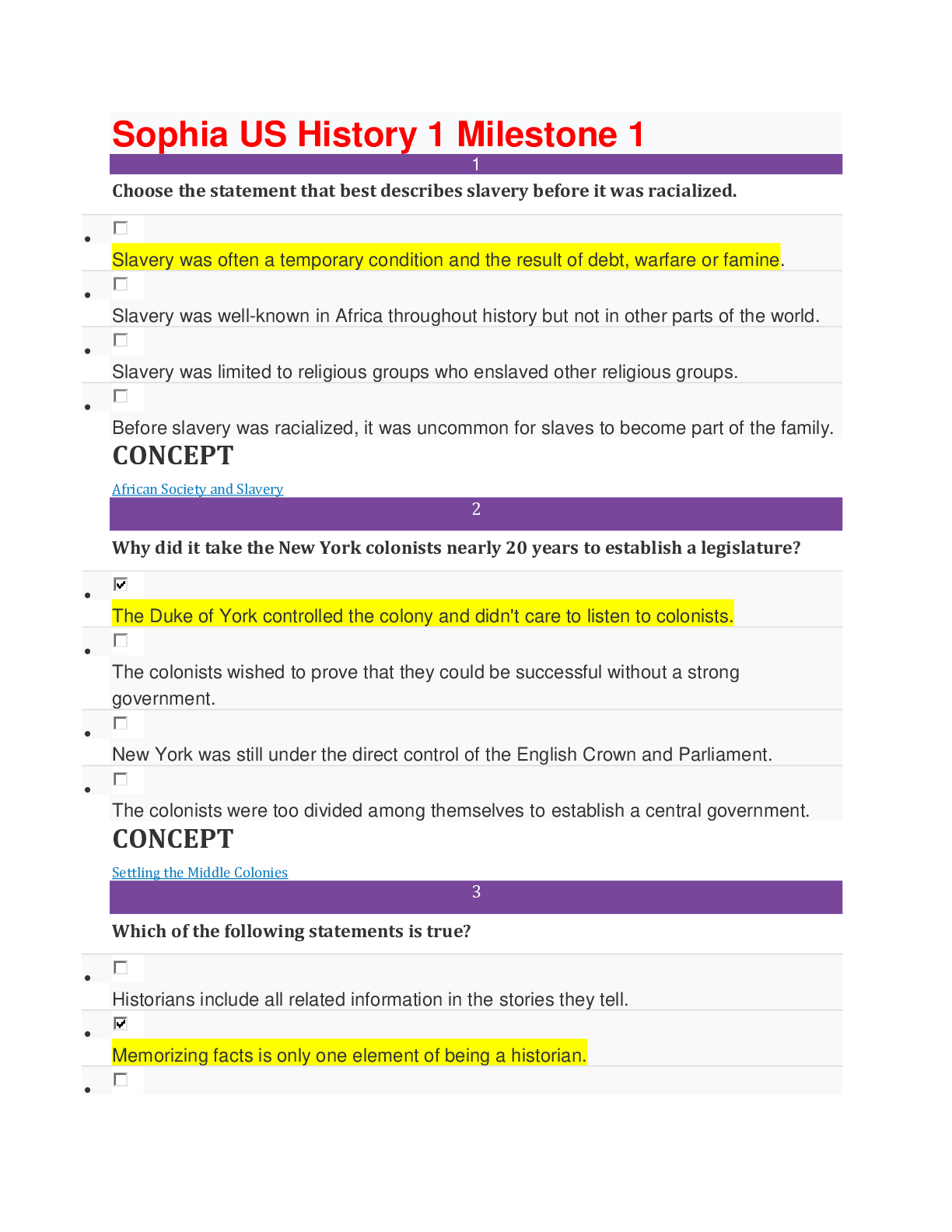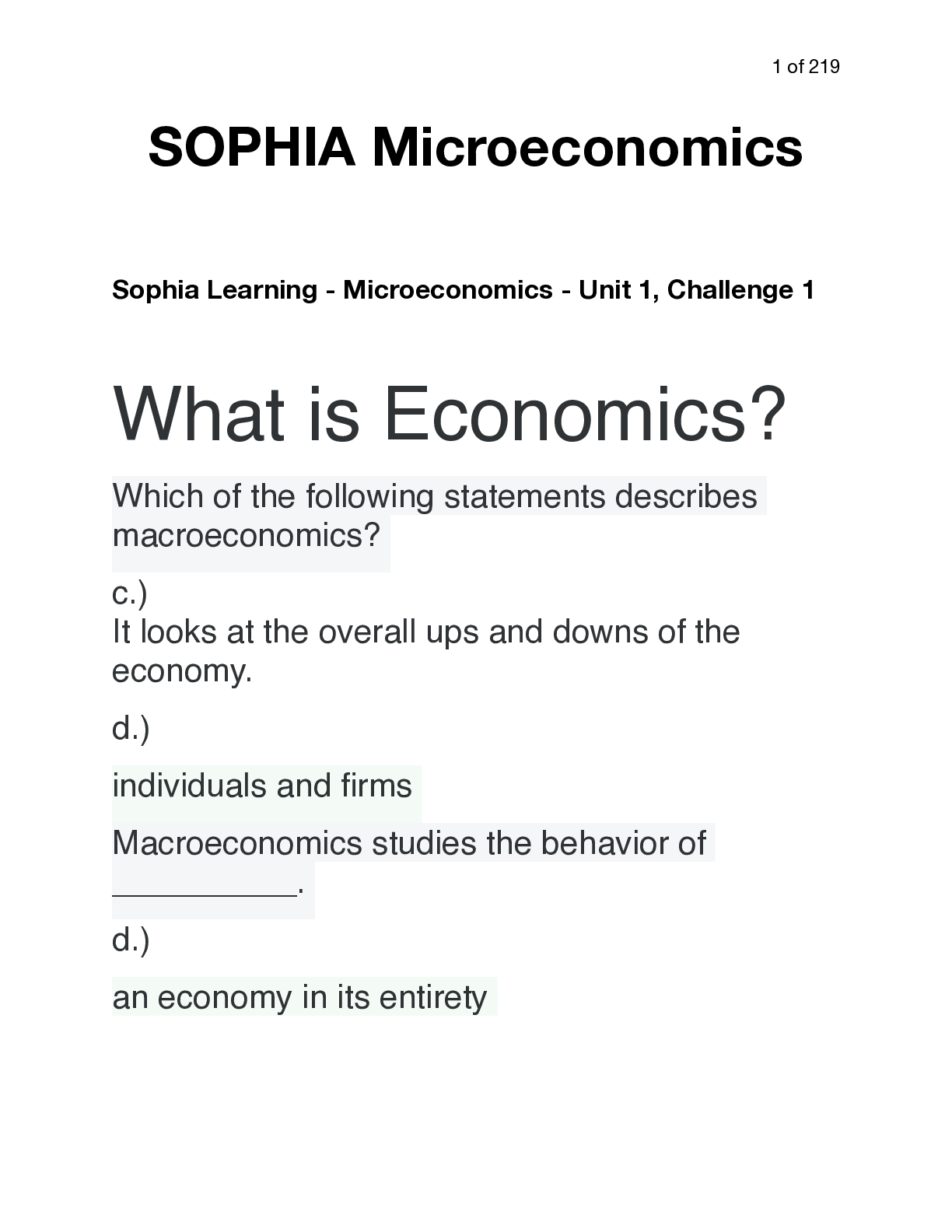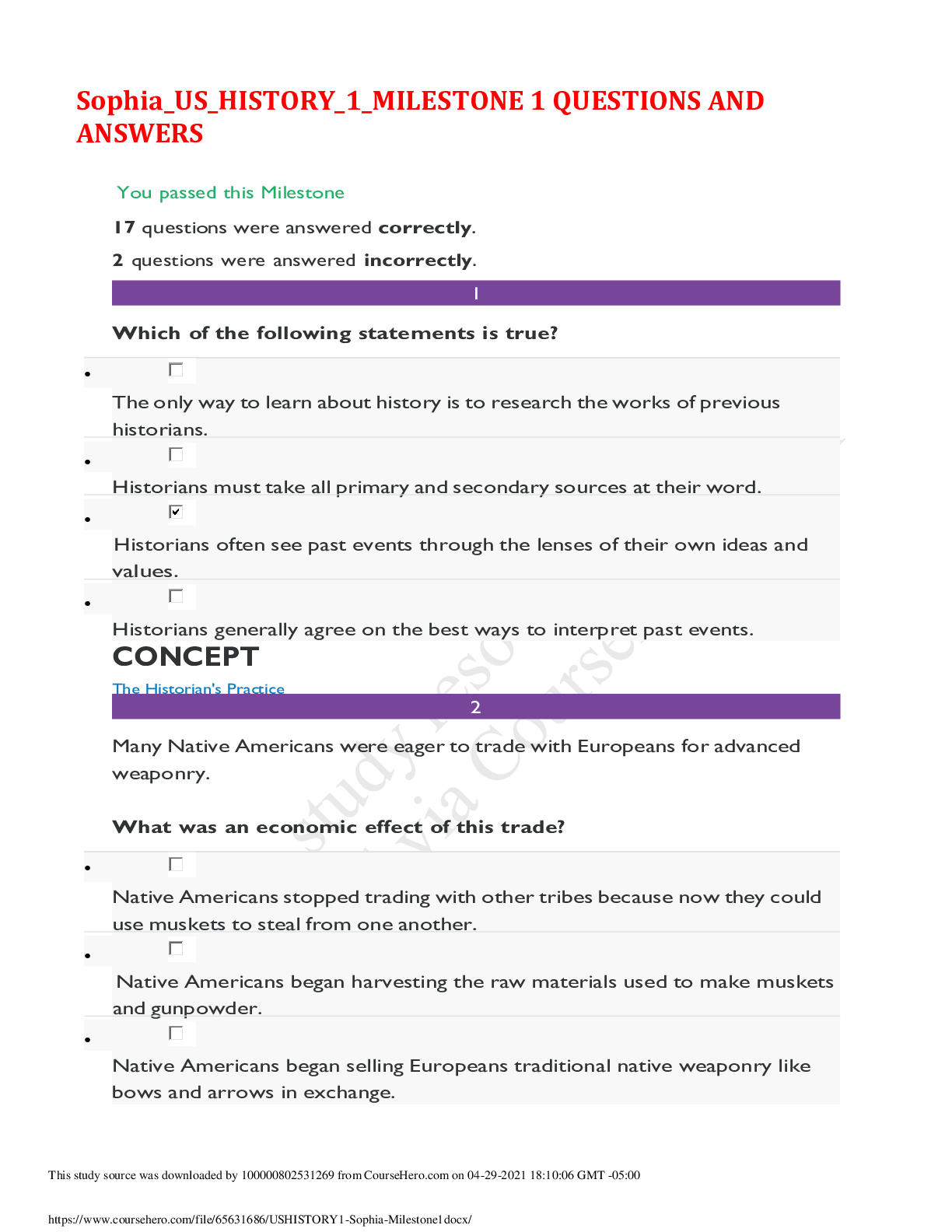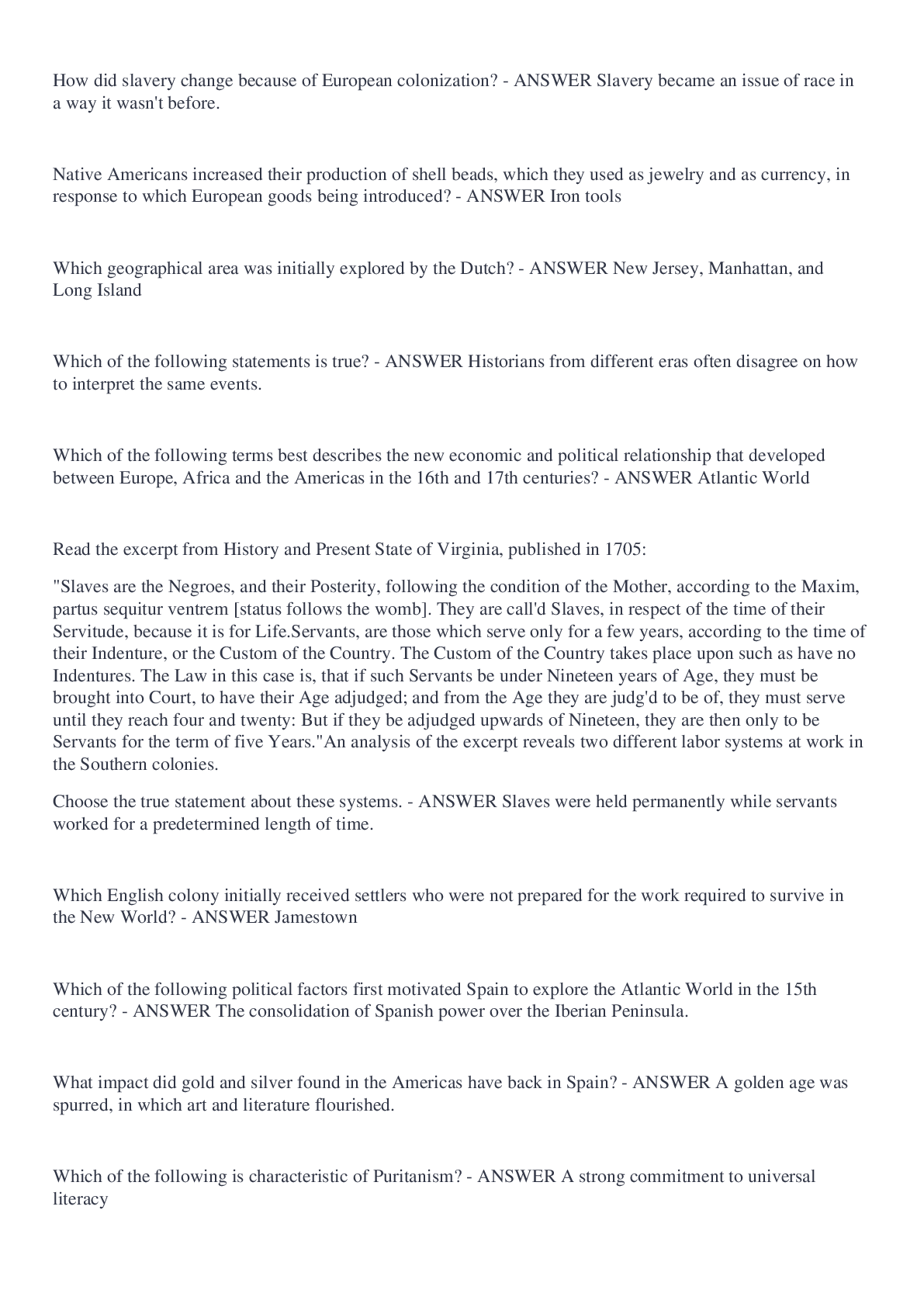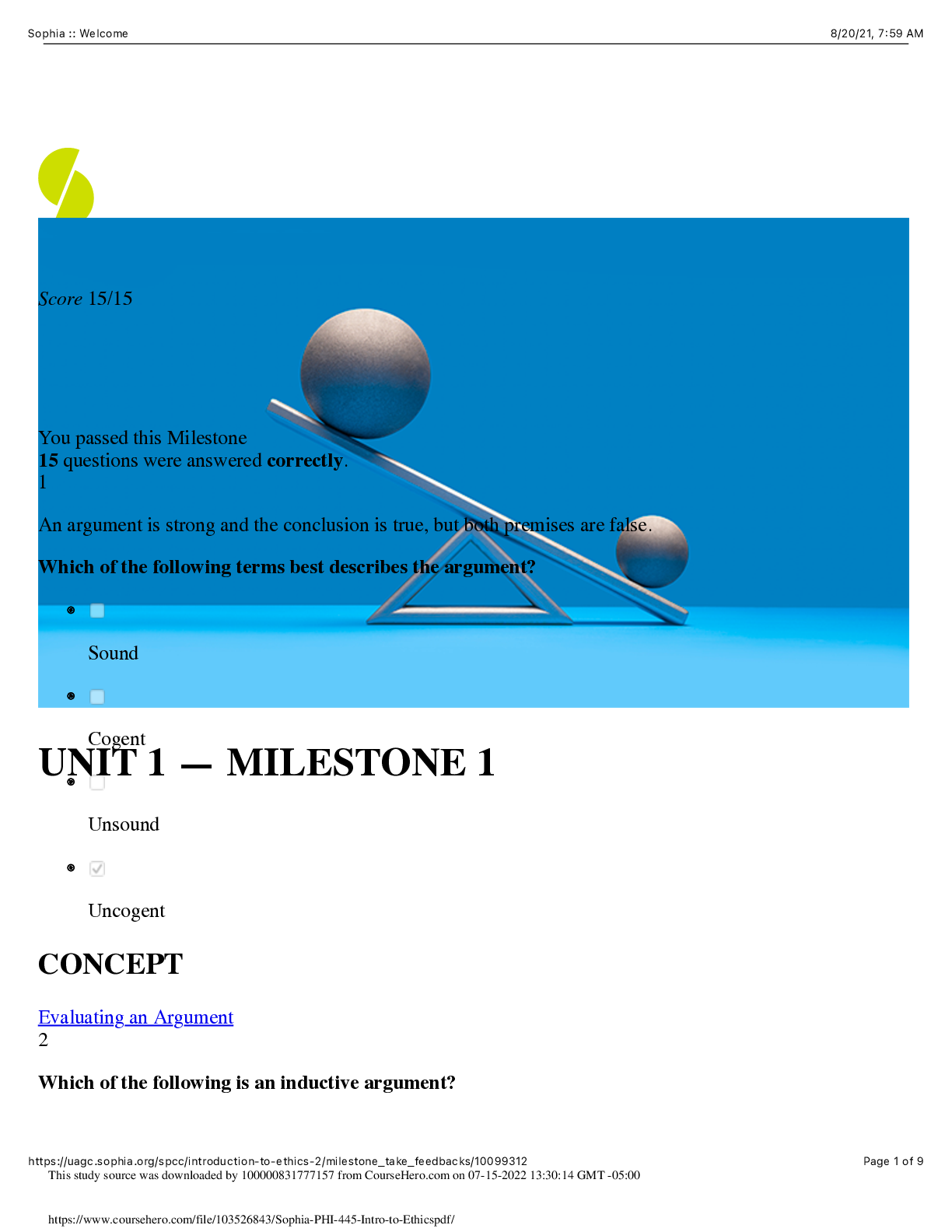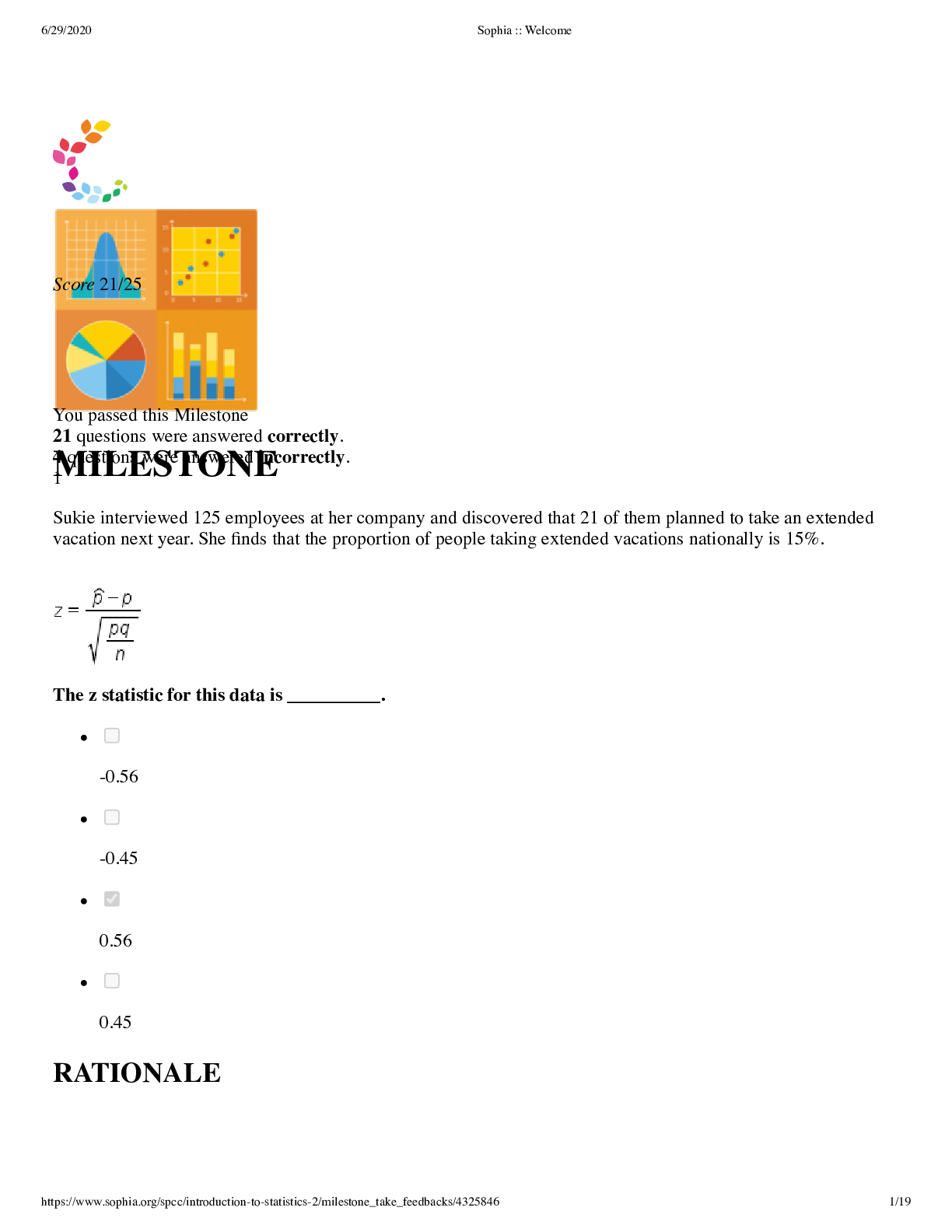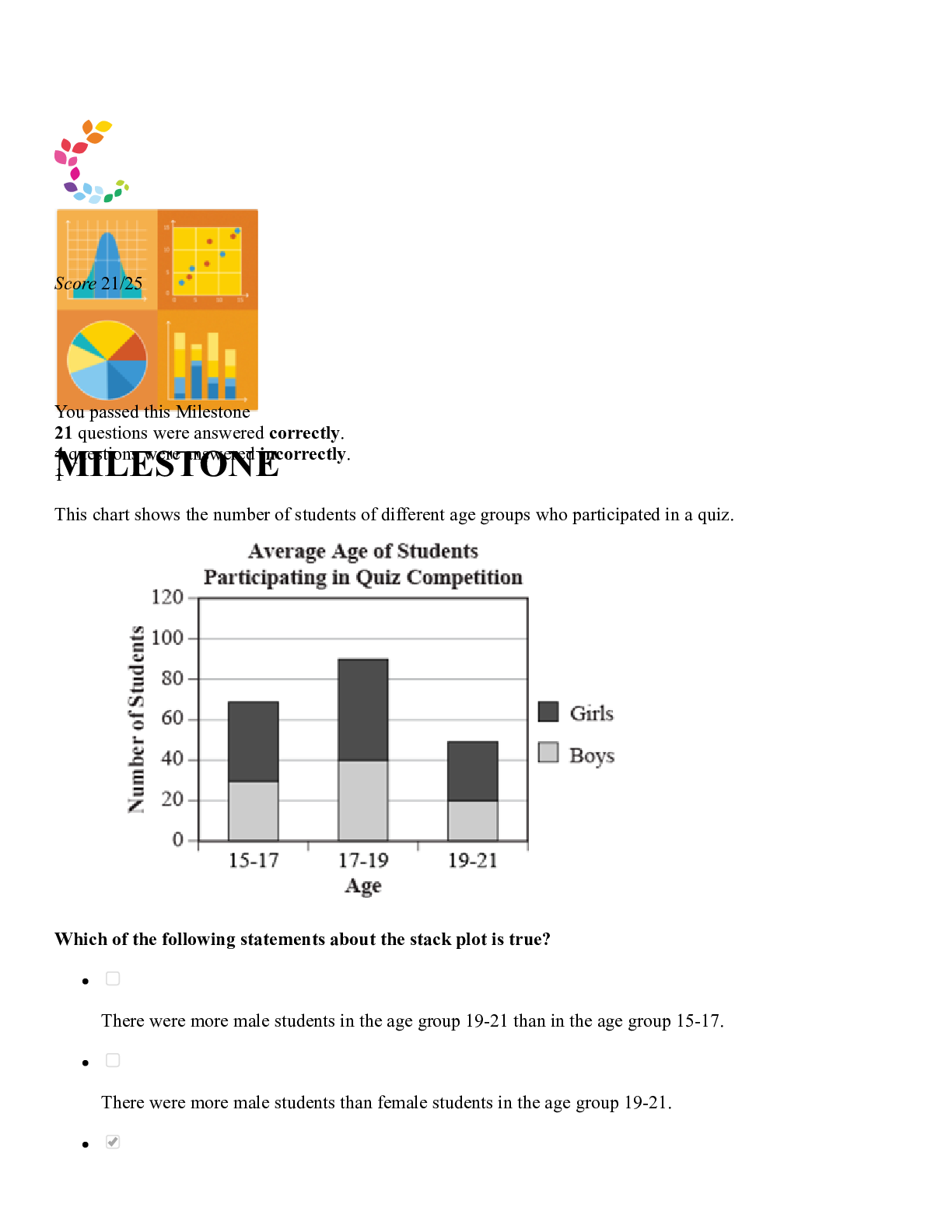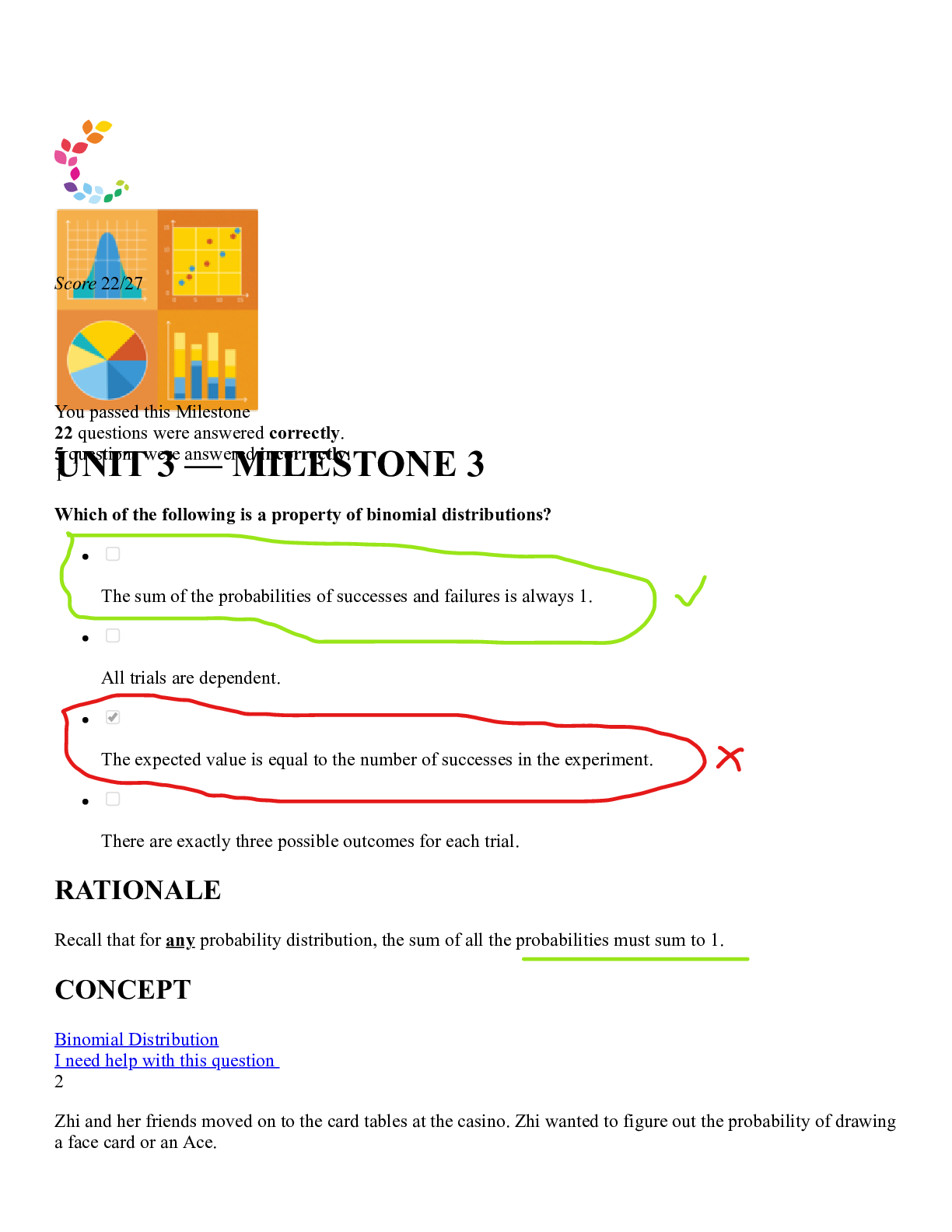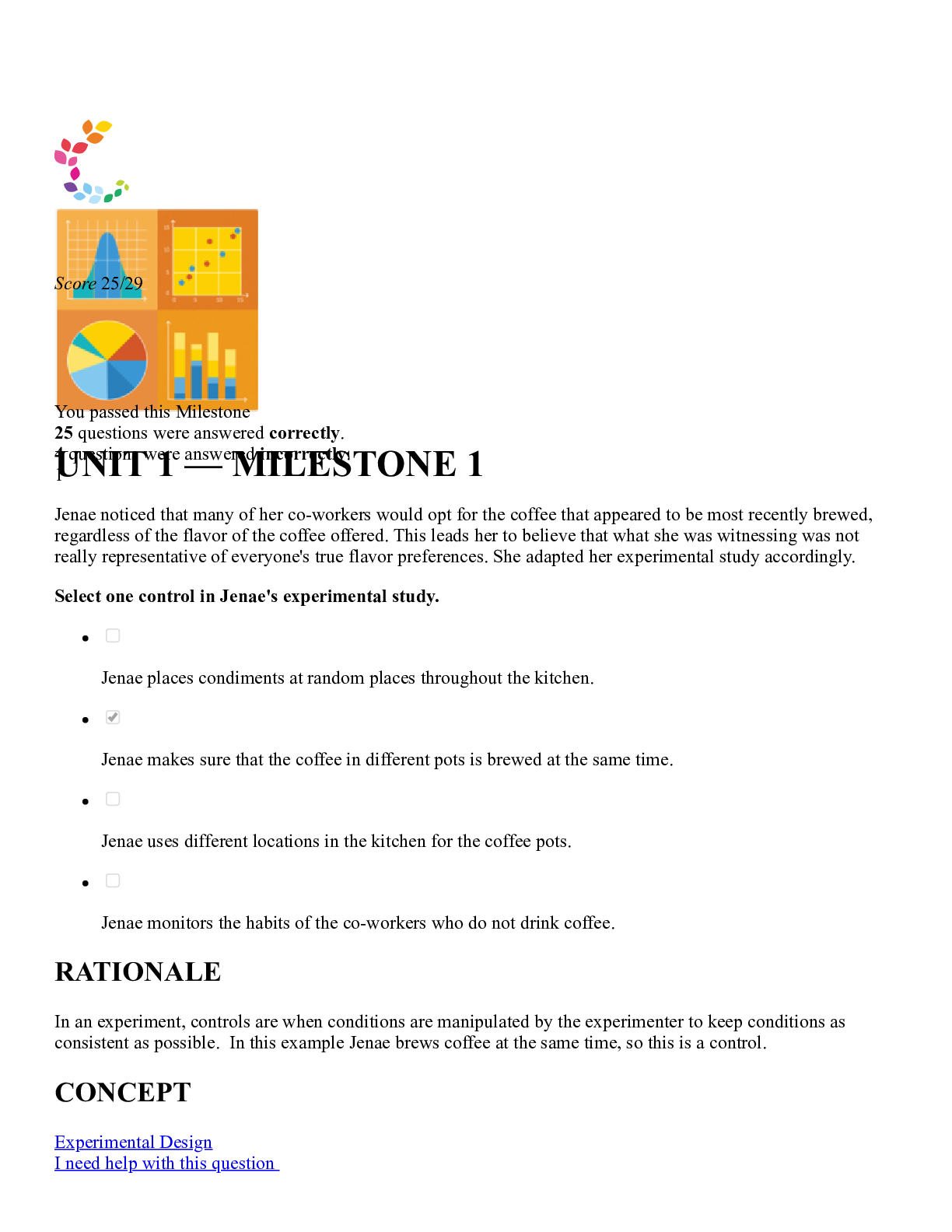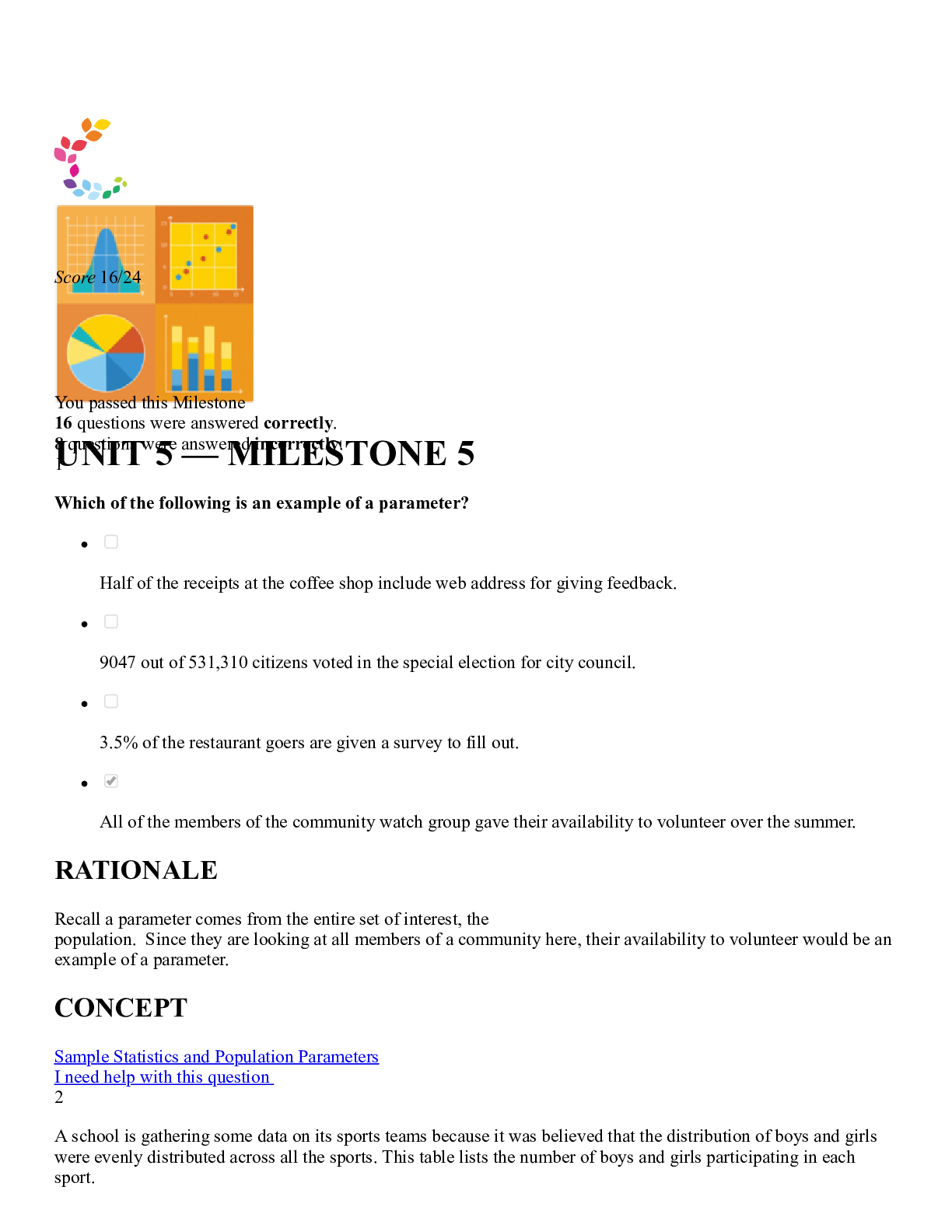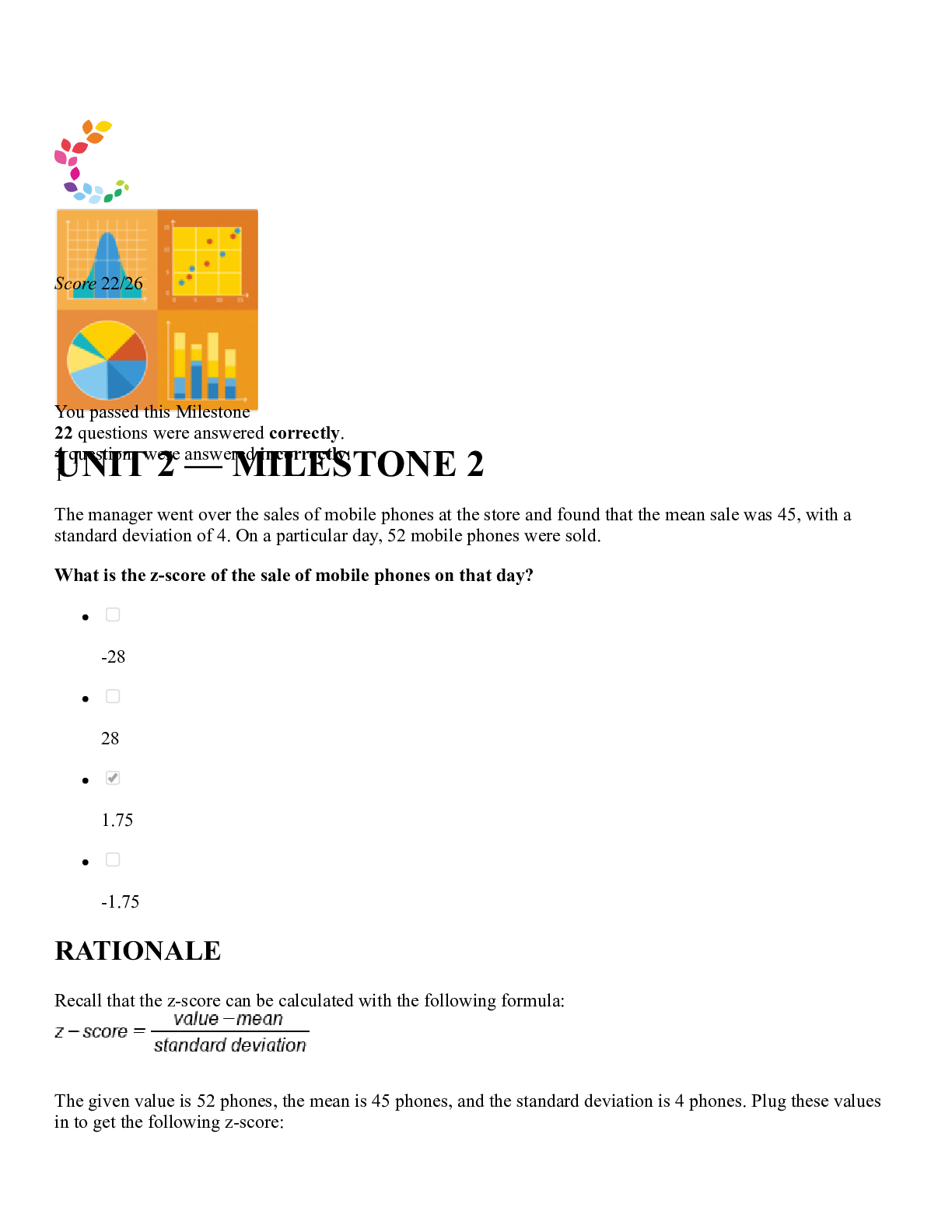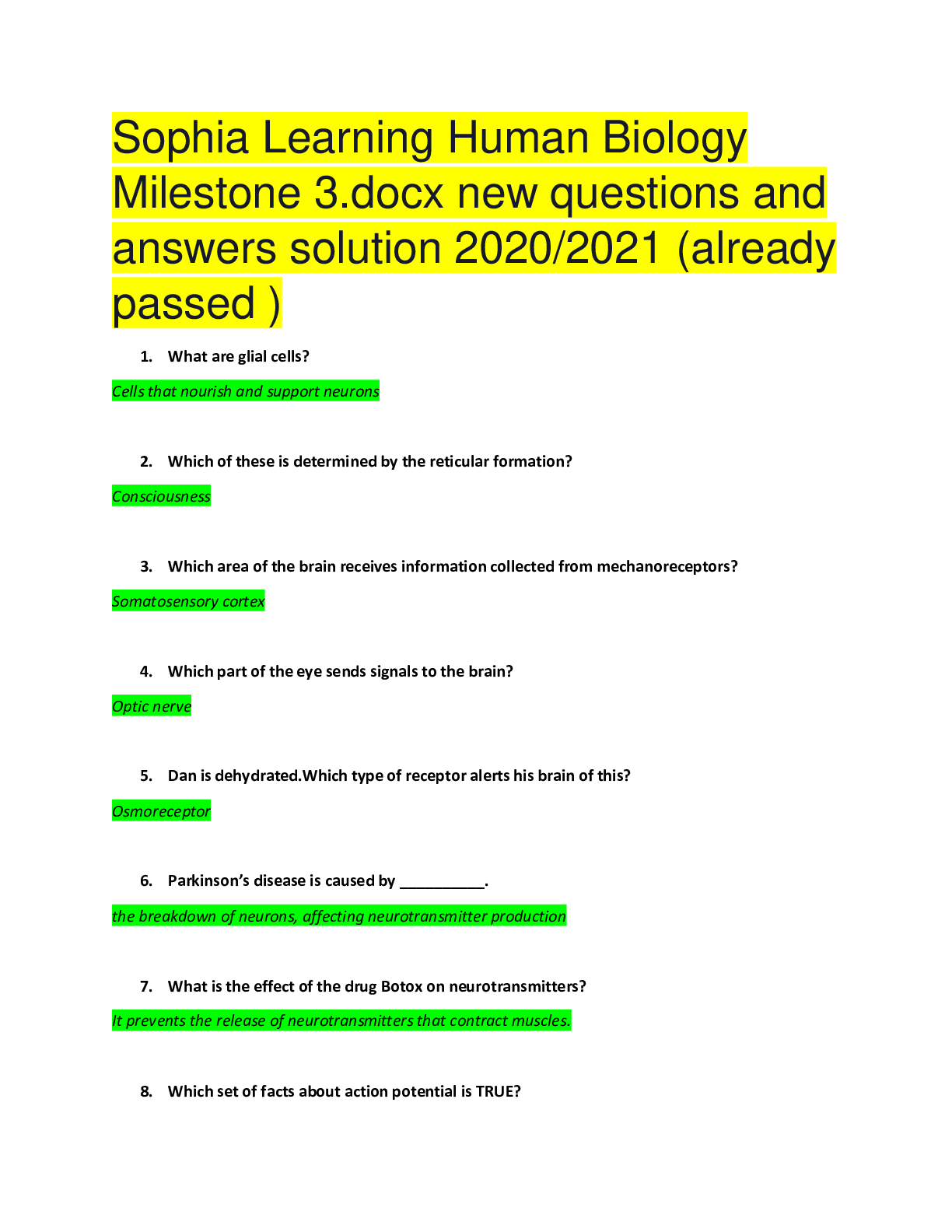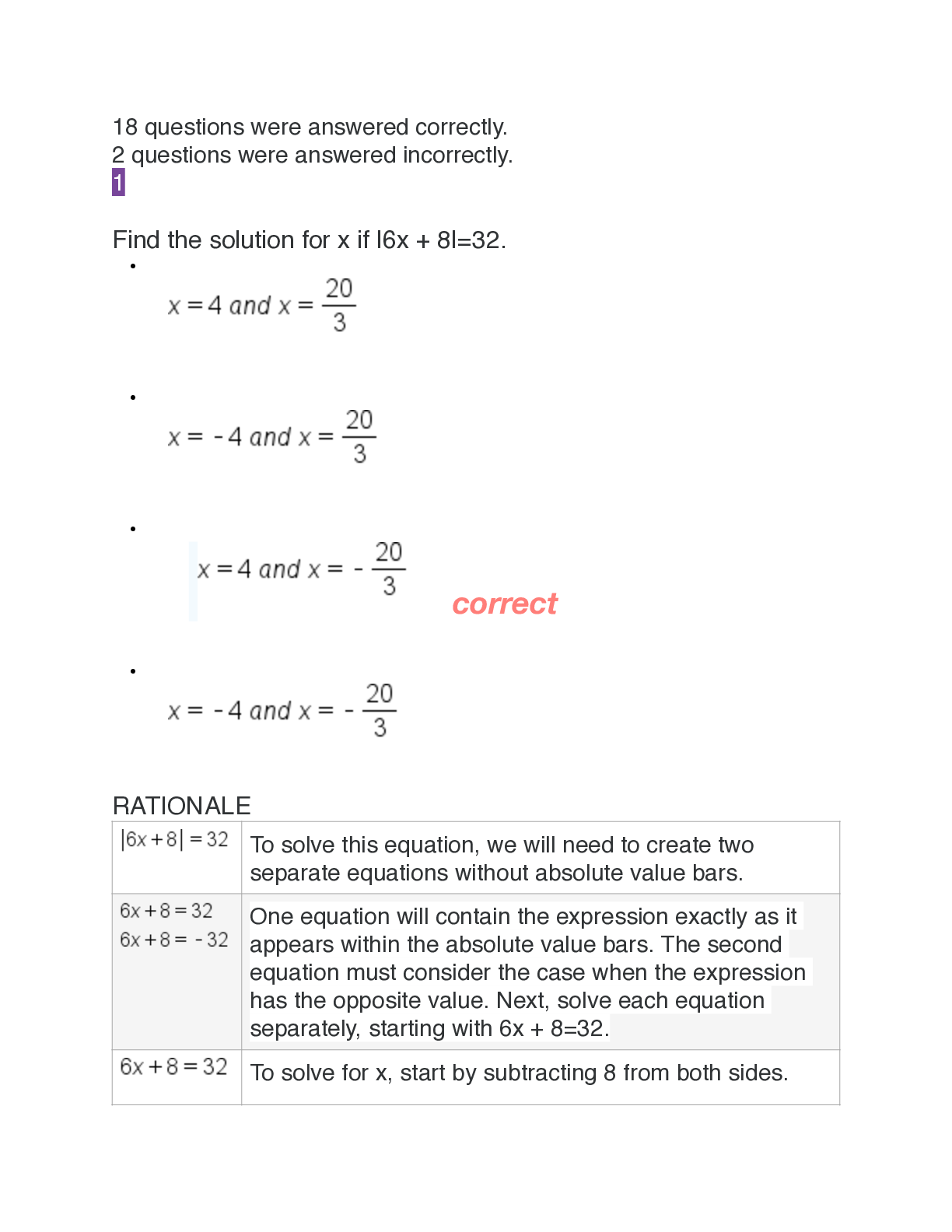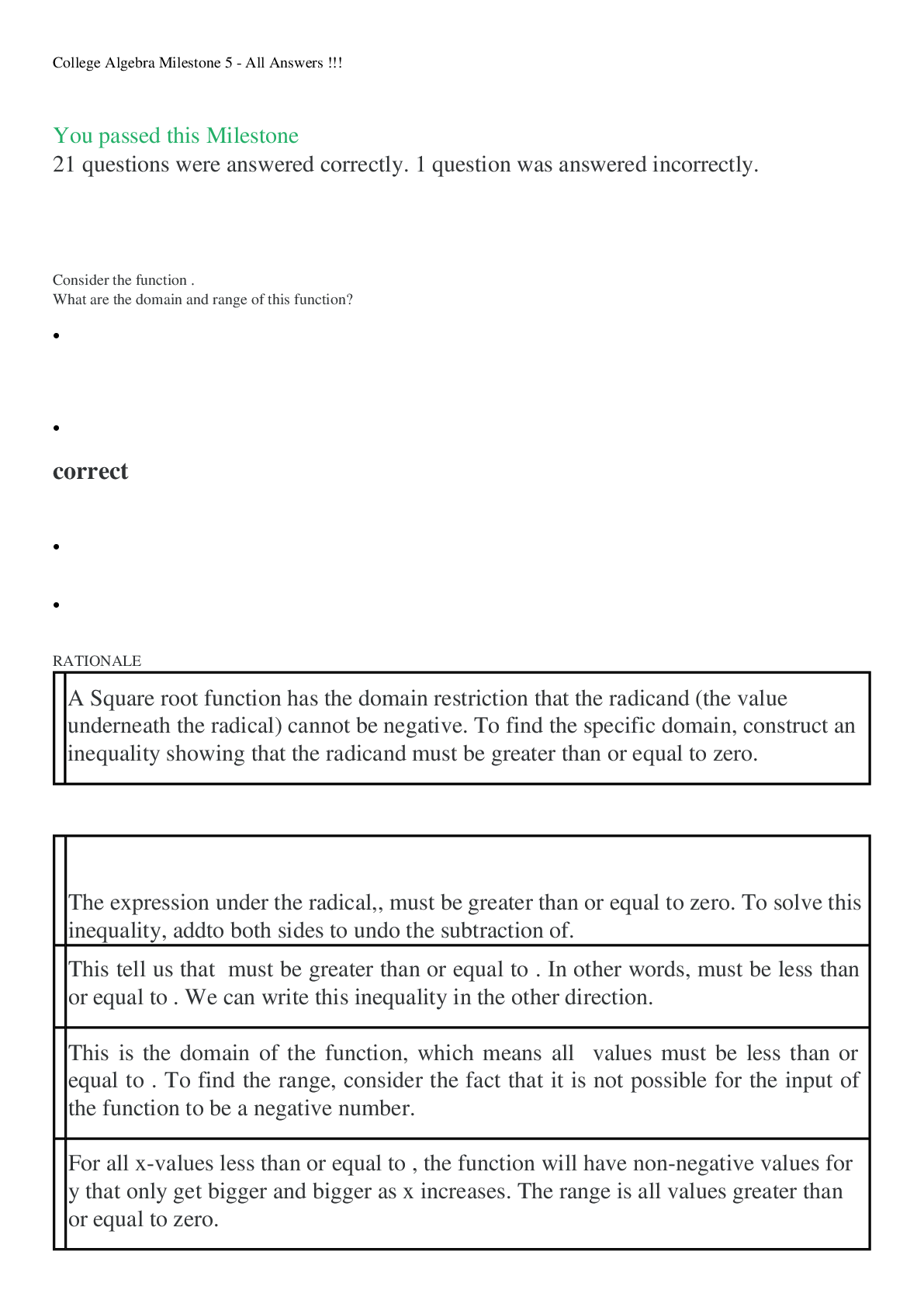Philosophy > SOPHIA Milestone > BUS 501 SOPHIA UNIT 1 MILESTONE 1 QUESTIONS AND ANSWERS (All)
BUS 501 SOPHIA UNIT 1 MILESTONE 1 QUESTIONS AND ANSWERS
Document Content and Description Below
Read the following statement by Socrates: “In questions of just and unjust, fair and foul, good and evil, which are the subjects of our present consultation, ought we to follow the opinion of the m... any and to fear them; or the opinion of the one man who has understanding?” Extract Socrates' argument from this text and choose the sentence that accurately reflects it. Non-experts have opinions, but the man who is an expert in a field has true knowledge. Absolute justice can only be achieved when the state agrees with the opinion of the masses. Any man who cares about ethics and wisdom has an obligation to listen to himself over others. Your text here 1 He who has experienced the administration of justice will do as the majority commands him to do. RATIONALE In this selection from the Crito, Socrates argues that we should consult experts (who have "understanding," or knowledge) when we seek wisdom, and not the majority (who have only opinion). CONCEPT The Apology — Socrates' Arguments 2 Which of the following is NOT an example of Aristotle’s notion of hylomorphism? Bodily organs and a human being A statue and a human being The soul and a human being An unborn child and a human being RATIONALE Aristotle's notion of hylomorphism states that being is a relationship, a union of form and matter. All of the examples that signify relationships are cases of hylomorphism: bodily organs (matter) and human beings (form); an unborn child (matter) and a human being (form); human beings (matter) and the soul (form). There is no ontological relationship between a statue and a human being, so this is not an example of hylomorphism. CONCEPT Aristotle on What There Is 3 Which of the following statements about the atomistic worldview is FALSE? The philosophical worldview of the early Greek atomists had great influence on philosophical, scientific, and religious thinking, but only for a brief period of time. Philosophical atoms of different shapes and consistencies are the fundamental components of reality. The worldview of philosophical atomists, with some revisions, has been adopted by contemporary science. Everything in the universe exists as a single atom, or a collection of atoms. RATIONALE The philosophical worldview of the early Greek atomists has continued to have an impact throughout history. Atomism has been adopted and modified by contemporary science, and has had a lasting influence on religion and theology. CONCEPT The Atomistic Worldview 4 Which of the following statements about Aristotle’s metaphysics is FALSE? The distinction between form and matter is purely conceptual— one does not, and cannot, exist without the other. Humans have the natural capacity to know many things without divine revelation or empirical evidence. Examining the nature of being, and knowing what kinds of things exist, is a sensible beginning point for philosophical inquiry. In order for a statement to be true, one must state that an object exists, what the object is, and the state in which it exists. RATIONALE Aristotle would agree with all of these statements except the suggestion that we can have knowledge without empirical evidence. To Aristotle, all knowledge is grounded in human experience and flows from empirical evidence. CONCEPT Aristotle on What There Is 5 Nancy is a cashier at a grocery store. A boy from her school, who she knows is underage, attempts to buy beer. Nancy hesitates before completing the transaction. According to Aristotle’s ethics, which question should Nancy ask herself? How can I reach a compromise? Why is this action right, and why is it wrong? What kind of person should I be? Are there possible consequences of this action that could harm me? RATIONALE Aristotelian ethics are primarily concerned with character. As a result, Nancy should ask herself “What kind of person should I be?” rather than “How should I act?” According to Aristotelian ethics, actions are evaluated based on how they inform your character. Therefore, Nancy must determine what kind of person she wants to be and what virtues she wants to cultivate, and then act accordingly. CONCEPT Applying Aristotle's Ethics 6 Being a good parent is a __________ condition for having a child. Apply conceptual analysis to this statement and choose the answer that correctly describes the relationship. sufficient, not necessary both necessary and sufficient neither necessary nor sufficient necessary, not sufficient RATIONALE Being a good parent is not a necessary condition, or logical requirement, for having a child because there are people who have children who aren't good parents. In order to be a parent, a person must have a child. That makes being a good parent a sufficient, but not a necessary condition for having a child. CONCEPT Plato: An academic approach to concepts 7 When Crito tries to convince Socrates that he must not betray his own life, how does Socrates respond? He says that all life has value, but society determines the fate of man. He says that what is right is often misunderstood by mortals and must be left to the gods. He says that life would not be worth living if the principle of justice was violated. He says that he is not afraid of dying and knows that his followers will restore his good name. RATIONALE In the Crito, Socrates' friend (Crito) tried to convince him to escape and avoid execution. Socrates refused to do so, and explained why escape would be wrong. Socrates asserted that not all life has intrinsic value; only the good life does. Since he believed that he would violate the principle of justice (established by the Social Contract) by avoiding death, Socrates refused to avoid it. CONCEPT The Crito: The Duties of the Social Contract 8 “As a physicist, I see all elements as either connected by love or separated by conflict.” Which ancient philosopher would most likely have made this statement? Empedocles Anaxagoras Xenophanes Pythagoras RATIONALE Empedocles was a Pre-Socratic philosopher and physicist who believed that everything in the cosmos was made up of six metaphysical entities. He believed that, rather than beginning and ending, everything in the universe resulted from the continuous mixing and separation of these entities. Although Empedocles's ideas were informed by the Pythagorean doctrine of reincarnation, Pythagoras is not the correct answer because he was not a physicist. CONCEPT Cosmology and the First Philosophers 9 Fred believes that the death penalty is ethically wrong. After watching a documentary about capital punishment, he discussed his belief with his wife. Choose the statement from Fred that is NOT consistent with his belief. [Show More]
Last updated: 1 year ago
Preview 1 out of 20 pages

Reviews( 0 )
Document information
Connected school, study & course
About the document
Uploaded On
Jun 08, 2022
Number of pages
20
Written in
Additional information
This document has been written for:
Uploaded
Jun 08, 2022
Downloads
0
Views
195



